Content Seo Vs Technical Seo: Which Is Better For You In 2023?
When it comes to optimizing your website for search engines, two key strategies reign supreme: Content SEO and Technical SEO. But what exactly do these terms mean, and how do they differ? In this article, we’ll dive into the world of SEO and explore the battle between Content SEO and Technical SEO.
First, let’s talk about Content SEO. As the name suggests, Content SEO focuses on the quality and relevance of the content on your website. It’s all about creating valuable, informative, and engaging content that appeals to both readers and search engine algorithms.
On the other hand, Technical SEO deals with the technical aspects of your website that can affect its visibility and performance in search results. This includes factors such as site speed, mobile-friendliness, URL structure, and crawlability. In short, Technical SEO ensures that search engines can easily access and understand your website.
So, which is more important? Content SEO or Technical SEO? The answer is that both are crucial for a successful SEO strategy. You need high-quality content that serves the needs of your audience, but you also need a technically sound website that search engines can easily navigate. Balancing these two elements will give you the best chance of ranking well in search results.
Now that we have a basic understanding of Content SEO and Technical SEO, let’s explore each strategy in more detail and discover how they can work together to boost your website’s visibility and drive organic traffic. So, let’s dive in and uncover the secrets behind these two powerful SEO tactics!
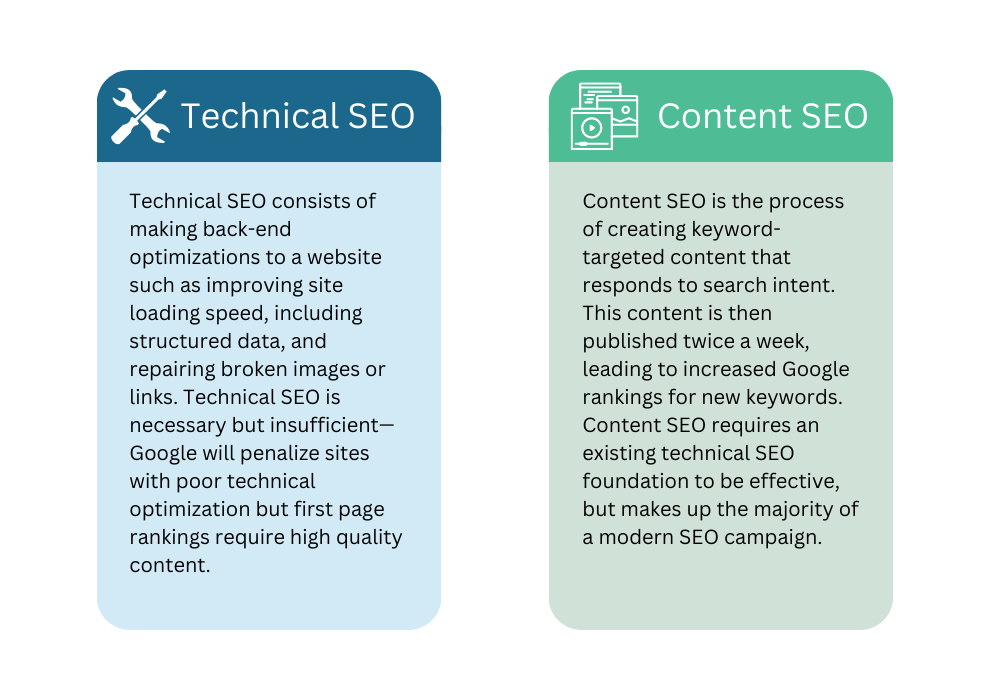
Key Takeaways: Content SEO vs Technical SEO
- Content SEO focuses on optimizing the actual content of a webpage.
- Technical SEO involves optimizing the technical aspects of a website to improve its search engine rankings.
- Content SEO focuses on creating high-quality and relevant content for users.
- Technical SEO focuses on improving website performance, site architecture, and user experience.
- Both Content SEO and Technical SEO are important for achieving higher search engine rankings and attracting organic traffic to a website.
Comparing Content SEO vs Technical SEO
Welcome to the ultimate showdown between Content SEO and Technical SEO! In this article, we’ll dive into the differences and similarities between these two important aspects of search engine optimization. Whether you’re a digital marketer or a website owner, understanding the nuances of Content SEO and Technical SEO is vital for achieving online success. So, let’s get started and explore the world of Content SEO and Technical SEO!
Overview of Content SEO
Content SEO, also known as on-page SEO, focuses on optimizing the content on your website to make it more appealing to search engines and users. It involves creating high-quality, relevant, and engaging content that meets the needs of your target audience. Content SEO encompasses various elements, including keyword research, content creation, meta tags optimization, internal linking, and user experience.
When it comes to Content SEO, the goal is to improve your website’s visibility in search engine results pages (SERPs) by ranking higher for relevant keywords. By optimizing your content, you can attract more organic traffic, increase your website’s authority, and ultimately drive more conversions.
Content SEO requires a deep understanding of your audience, their search intent, and the topics they are interested in. It involves strategically incorporating keywords into your content, optimizing your meta tags to improve click-through rates, and ensuring a seamless user experience on your website.
Overview of Technical SEO
While Content SEO focuses on the actual content of your website, Technical SEO deals with the behind-the-scenes aspects that affect your site’s visibility in search engines. It involves optimizing your website’s technical infrastructure to improve its crawling, indexing, and overall performance.
Technical SEO covers a wide range of technical elements, including website speed, mobile-friendliness, URLs, redirects, XML sitemaps, robots.txt, canonical tags, and structured data. By optimizing these technical aspects, you can ensure that search engines can effectively crawl and understand your website’s content, leading to higher rankings in search results.
Technical SEO plays a critical role in improving your website’s visibility and accessibility for both search engines and users. By optimizing your website’s technical foundation, you can enhance user experience, minimize site errors and issues, and create a solid foundation for your content to thrive.
Key Features Compared
Now that we have a good understanding of Content SEO and Technical SEO let’s dive into the key features and compare them to see how they differ.
Keyword Research
Content SEO: Keyword research is a crucial component of Content SEO. It involves identifying relevant keywords and phrases that your target audience is searching for and strategically incorporating them into your content.
Technical SEO: Keyword research is not directly related to Technical SEO. However, understanding the keywords your target audience is using can help you optimize other technical aspects of your website, such as URLs and internal linking structure.
Content Creation
Content SEO: Content creation is at the core of Content SEO. It involves developing high-quality, informative, and engaging content that answers your audience’s questions and provides value. Optimal keyword usage, proper formatting, and compelling headings are essential for Content SEO.
Technical SEO: While Technical SEO doesn’t focus on content creation, it does play a role in ensuring that your content is accessible and properly structured on your website. Technical elements like Schema markup, structured data, and canonical tags can enhance your content’s visibility in SERPs.
Meta Tags Optimization
Content SEO: Metatags, such as title tags and meta descriptions, play a vital role in Content SEO. Optimizing these tags with relevant keywords and compelling descriptions can improve your click-through rates and attract more organic traffic.
Technical SEO: Technical SEO focuses on optimizing meta tags to ensure they are properly implemented and provide accurate information to search engines. This includes avoiding duplicate title tags and meta descriptions, crafting concise and descriptive tags, and ensuring proper indexing using robots meta tags.
Internal Linking
Content SEO: Internal linking is an important aspect of Content SEO. By strategically linking related pages and articles within your website, you can improve site navigation, distribute link authority, and enhance user experience.
Technical SEO: From a technical standpoint, ensuring proper internal linking structure and implementing breadcrumb navigation can improve the overall crawlability and indexability of your website.
Site Speed
Content SEO: Site speed is crucial for Content SEO. A fast-loading website provides a better user experience, reduces bounce rates, and improves search engine rankings. Optimizing image sizes, minimizing code, and leveraging browser caching are some techniques used to improve site speed.
Technical SEO: Technical SEO focuses on optimizing your website’s technical infrastructure to enhance site speed. Techniques like enabling compression, leveraging browser caching, minimizing redirects, and reducing server response time contribute to improved site speed.
Mobile-Friendliness
Content SEO: With the increasing use of mobile devices, having a mobile-friendly website is vital for Content SEO. Mobile-responsive design, legible text, and easy navigation on smaller screens are crucial elements for a mobile-friendly website.
Technical SEO: Technical SEO plays a significant role in ensuring your website is mobile-friendly. Implementing responsive design, testing your website’s mobile-friendliness, and optimizing for mobile speed contribute to a better user experience and improved search engine rankings.
User Experience
Both Content SEO and Technical SEO contribute to the overall user experience of your website. A seamless, user-friendly website is essential for attracting and retaining visitors. Content SEO focuses on providing valuable and engaging content, while Technical SEO ensures that the website is technically sound and easy to navigate.
Content SEO ensures that your content meets the needs of your target audience and provides value. By understanding your audience’s search intent and crafting content that answers their questions, you can create a positive user experience and build trust with your visitors.
Technical SEO, on the other hand, focuses on the technical aspects of your website that affect user experience. It ensures that your website is fast-loading, mobile-friendly, accessible to all users, and easy to navigate. By optimizing these technical elements, you create a seamless user experience and increase user satisfaction.
Pros and Cons
Pros and Cons of Content SEO
Pros:
- Content SEO helps improve your website’s visibility and rankings in search engine results.
- It helps attract organic traffic and increase brand awareness.
- Content SEO allows you to provide valuable and engaging content to your target audience.
- It helps build trust and credibility with your audience.
- Content SEO is a long-term strategy that can drive sustainable results.
Cons:
- Content SEO requires consistent effort and ongoing optimization.
- It can be time-consuming to create high-quality content.
- Content SEO alone may not be enough to drive significant results without proper technical optimization.
- It may take time to see the impact of Content SEO efforts on search engine rankings.
Pros and Cons of Technical SEO
Pros:
- Technical SEO ensures that your website is technically optimized for search engines.
- It improves your website’s crawlability and indexability.
- Technical SEO helps enhance user experience by optimizing site speed and mobile-friendliness.
- It contributes to better search engine rankings and visibility.
- Technical SEO lays the foundation for successful Content SEO efforts.
Cons:
- Technical SEO can be complex and requires technical knowledge or assistance.
- Improper technical optimization can negatively impact your website’s visibility and rankings.
- Technical SEO requires ongoing monitoring and maintenance to keep up with evolving search engine algorithms.
- It may not directly contribute to the creation of high-quality content.
Price Comparison
In terms of pricing, both Content SEO and Technical SEO require investments, but they can vary depending on various factors, such as the size and complexity of your website, the level of competition in your industry, and the resources available to you.
Content SEO often involves costs related to content creation, keyword research tools, and potentially hiring content writers or digital marketing agencies to help with strategy and execution. The costs can vary significantly based on your specific needs and requirements.
Technical SEO may involve costs related to website audits, technical optimization tools, website development or maintenance, and potentially hiring technical SEO experts or agencies. Like Content SEO, the costs can vary based on the complexity of your website and the level of technical expertise needed.
It’s important to consider the long-term benefits and potential ROI when evaluating the costs associated with both Content SEO and Technical SEO. It’s often worth the investment to optimize both aspects to achieve the best results in terms of search engine rankings, organic traffic, and overall online success.
Comparison Table
| Feature | Content SEO | Technical SEO |
|---|---|---|
| Keyword Research | Involves identifying relevant keywords and phrases for content optimization. | Not directly related to Technical SEO, but understanding keywords can help optimize other technical elements. |
| Content Creation | Focuses on developing high-quality and engaging content. | While not the primary focus, technical elements can enhance the visibility of content in search results. |
| Meta Tags Optimization | Optimizes meta tags for improved click-through rates and relevance. | Optimizes meta tags to ensure proper implementation and accurate information. |
| Internal Linking | Improves site navigation and distributes link authority. | Ensures proper internal linking structure for crawlability and indexability. |
| Site Speed | Optimizes website speed for better user experience and search engine rankings. | Ensures technical optimization for improved site speed. |
| Mobile-Friendliness | Ensures a mobile-friendly website for better user experience. | Optimizes technical elements for mobile-friendliness. |
Which is Better – Content SEO vs Technical SEO?
Now comes the question you’ve all been waiting for – which is better, Content SEO or Technical SEO? The truth is, both are essential for a successful SEO strategy. Content SEO focuses on creating valuable and engaging content that meets the needs of your target audience, while Technical SEO ensures that your website is technically optimized for search engine crawlers and provides a seamless user experience.
Here are three reasons why you should prioritize both Content SEO and Technical SEO:
- Content SEO and Technical SEO are interdependent: While Content SEO aims to deliver high-quality content, it needs the backing of Technical SEO to maximize its potential. Without Technical SEO, your content may not reach its full potential in terms of visibility and rankings.
- Users and search engines go hand in hand: Content SEO helps attract and engage users, while Technical SEO ensures that your website is search engine-friendly. By combining both, you can create a positive user experience and improve your website’s visibility in search engine results.
- A holistic approach for long-term success: Incorporating both Content SEO and Technical SEO as part of your overall SEO strategy allows you to cover all bases. By investing in both aspects, you can create a solid foundation for your website, deliver high-quality content, and drive sustainable organic traffic over time.
In conclusion, Content SEO and Technical SEO are two sides of the same coin. To achieve optimal results and maximize your website’s potential, it’s crucial to prioritize both aspects and ensure a harmonious integration between high-quality content and technical optimization. By doing so, you’ll be well on your way to SEO success!
Frequently Asked Questions
When it comes to optimizing your website for search engines, there are two main aspects to consider: Content SEO and Technical SEO. While both are crucial for a successful SEO strategy, they focus on different elements of your website. To help you understand the difference between the two, here are some frequently asked questions:
1. How does Content SEO differ from Technical SEO?
Content SEO revolves around creating high-quality, valuable content that is optimized for specific keywords and provides a great user experience. This includes keyword research, writing informative and engaging content, optimizing meta tags, headings, and image alt tags, and ensuring your content is easily readable and accessible to both users and search engines.
On the other hand, Technical SEO deals with the technical aspects of your website that affect its visibility in search engine results. This includes optimizing your site’s speed, fixing broken links, improving mobile-friendliness, creating an XML sitemap, and using structured data markup. Technical SEO ensures that search engines can crawl and index your website effectively, leading to better visibility in search results.
2. Which one is more important: Content SEO or Technical SEO?
Both Content SEO and Technical SEO are equally important for a successful SEO strategy. Content SEO helps you create valuable and relevant content that attracts and engages your target audience, while Technical SEO ensures that search engines can find, crawl, and understand your website. Without quality content, your website may not have anything valuable to offer users, but without proper technical optimization, search engines may struggle to rank your content.
Therefore, it’s important to find a balance between the two. Focus on creating high-quality content that is optimized for keywords, while also investing in technical optimization to ensure your content reaches the widest possible audience.
3. Can I have good Content SEO without Technical SEO?
While it’s possible to have good Content SEO without extensive Technical SEO, it may limit the potential of your website. Even if you have excellent content, if your site has technical issues such as slow loading times or broken links, it can negatively impact user experience and search engine visibility.
Technical SEO ensures that your website is optimized for search engines, making it easier for them to crawl, index, and rank your content. By investing in Technical SEO, you can enhance user experience, improve website performance, and maximize the reach and visibility of your valuable content.
4. Do I need to prioritize one over the other?
When it comes to Content SEO and Technical SEO, it’s not about prioritizing one over the other, but rather finding the right balance between the two. Content SEO helps you create valuable and optimized content that attracts and engages your audience, while Technical SEO ensures that your website is technically optimized for search engines.
By prioritizing both Content SEO and Technical SEO, you can create a strong foundation for your website’s organic visibility. Focus on creating high-quality content that is optimized for keywords, while also investing in technical optimizations to enhance user experience and improve your website’s overall performance.
5. Can I master both Content SEO and Technical SEO on my own?
Mastering both Content SEO and Technical SEO can be challenging, especially if you’re new to the world of SEO. However, with the right resources, learning materials, and practice, it is possible to gain a good understanding of both aspects.
Start by educating yourself on the best practices for Content SEO and Technical SEO. There are numerous online articles, tutorials, and courses available that can help you grasp the fundamentals. Experiment with different strategies and techniques, monitor your website’s performance, and analyze the results. Over time, you can fine-tune your skills and become proficient in both Content SEO and Technical SEO.
Technical SEO vs Content Optimization
Summary
Now that we’ve explored the world of Content SEO versus Technical SEO, let’s recap what we’ve learned. Content SEO focuses on creating high-quality and engaging content for your website. It’s all about writing articles that people will love and find helpful. On the other hand, Technical SEO deals with the technical aspects of your website, like making sure it loads quickly and is easy for search engines to understand.
When it comes to Content SEO, remember to use keywords naturally in your articles, create strong headlines, and organize your content with clear headings. Additionally, it’s important to promote your content through social media and get other websites to link to your articles.
Turning our attention to Technical SEO, we must ensure that your website runs smoothly by optimizing its speed and ensuring it is mobile-friendly. You should also create a search engine-friendly URL structure, use descriptive image alt text, and set up XML sitemaps.
Both Content SEO and Technical SEO are crucial for a successful website. While Content SEO focuses on creating valuable content for human readers, Technical SEO helps search engines understand and rank your website properly. By combining both strategies, you’ll have a powerful formula to boost your website’s visibility and attract more visitors.
So, keep honing your writing skills, pay attention to technical details, and always strive to create the best website possible. With the knowledge you’ve gained, you’re well on your way to becoming an SEO superstar!
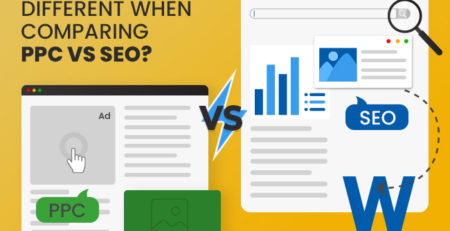
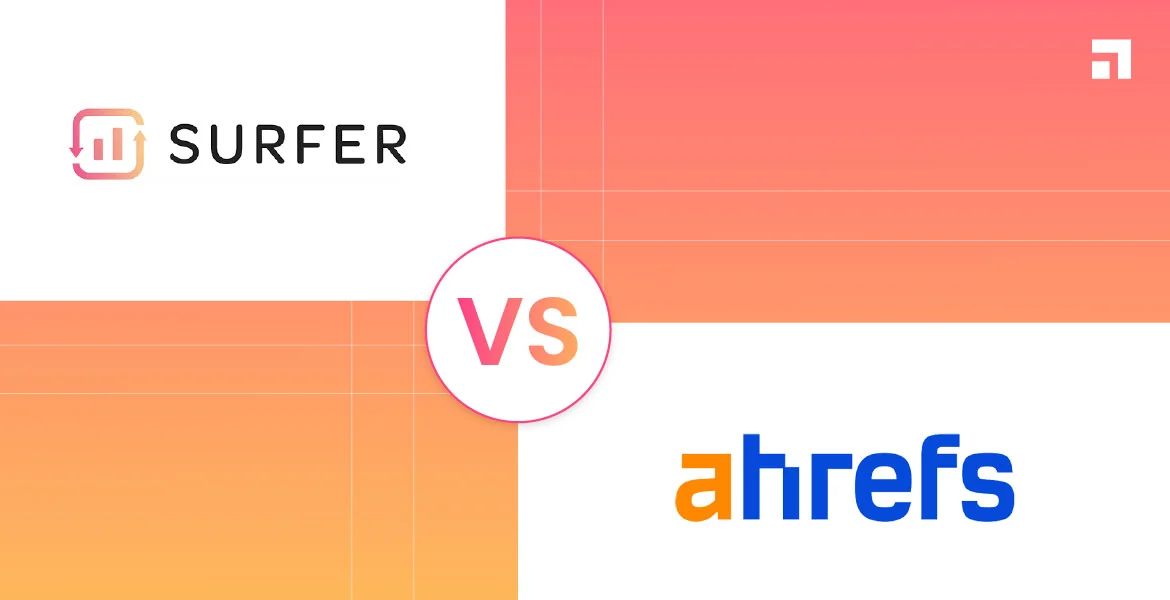



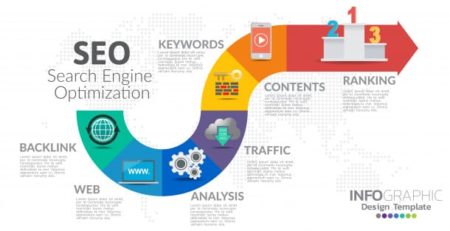
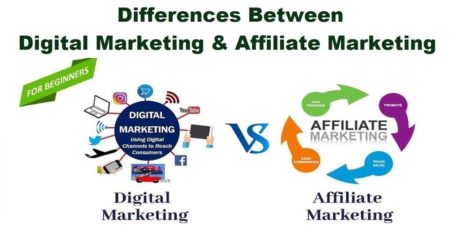
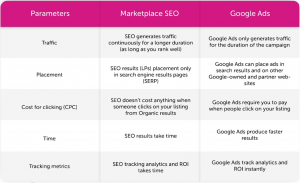
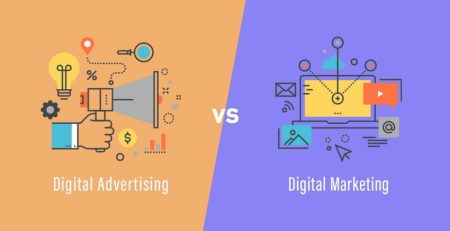
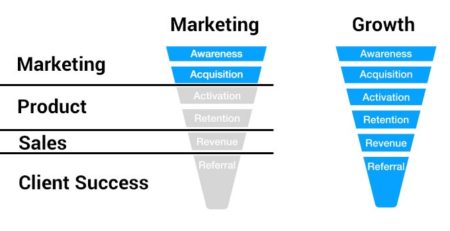
Leave a Reply